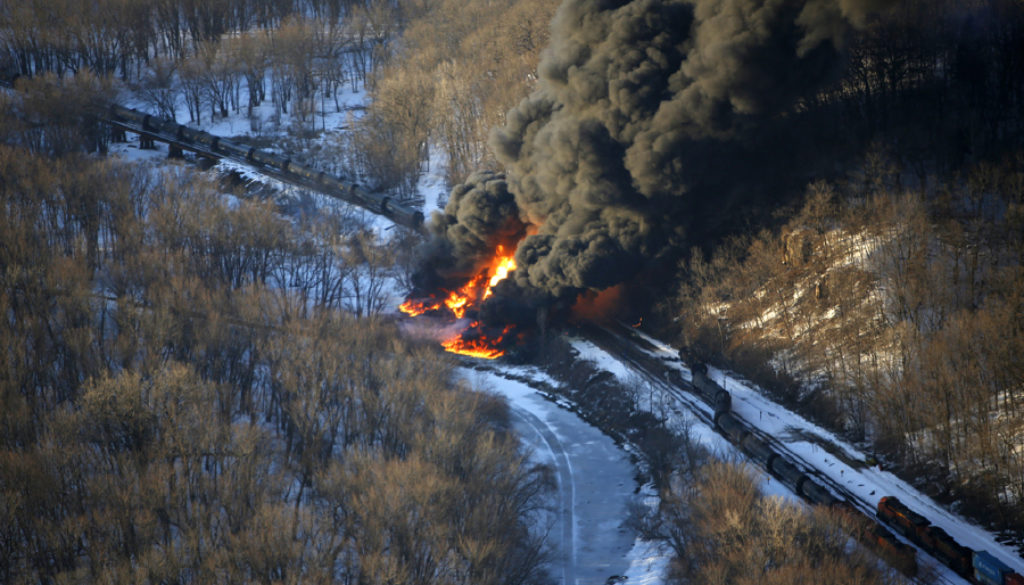Dangers of Oil Trains: The Mosier Accident
By Ray Wan, Earthjustice
The latest wake-up call on the dangers of transporting explosive crude oil by train happened just thirty miles from where Earthjustice was having its June board meeting. The plume of black, acrid smoke marring the otherwise clear blue sky was a stark reminder of why our attorneys are fighting against crude-by-rail: this dangerous practice puts profits ahead of people, threatening the health and safety of communities along the rail lines.

1The Union Pacific oil train was carrying Bakken crude oil when it derailed in the town of Mosier, Oregon. Emergency responders immediately evacuated a quarter of the town’s residents, a necessary precaution to avoid tragedies like the one that struck the Canadian town of Lac-Mégantic in 2013, when an oil train explosion killed 47 people and destroyed the town center. Unusually calm winds saved this from becoming an even greater disaster.

2 Sixteen cars derailed, and four caught on fire. Union Pacific estimates that 42,000 gallons of crude oil was spilled. Ironically, the cars involved in the accident, jacketed CPC-1232 tank cars, are supposed to be the safest on the rails. The Mosier waste water treatment plant and sewer system were not operational following the accident. Residents were told not to flush their toilets and advised to boil any water before they drank it or cooked with it. Mosier exhausted its water reserves fighting the fire and cooling the trains. Communities across the country have been voicing their frustration with crude-by-rail traffic for several years.

3 Oil booms were placed in the Columbia River to prevent large scale water contamination. Despite these efforts, authorities still detected an oil sheen on the river, prompting fears that the leaked oil could impact fish in the river.

4 As is common this time of year, a barge carried juvenile salmon just a few miles from the site of the oil train derailment. The Columbia River and its tributaries remain one of the most important habitats for salmon in the Pacific Northwest. Tribal nations, such as the Umatilla, Nez Perce, Warm Springs, and Yakama, have treaty-reserving fishing rights in the river, which is a cultural centerpiece for their people.

5 A motorboat pulls a water skier past the smoldering site of the Mosier oil train accident. The Columbia River Gorge is not only vital for wildlife, it is a vital economic hub that is dependent on tourism and recreation, an industry that brings in $10.8 billion annually to Oregon’s economy.

6 Earthjustice Senior Fossil Fuel Attorney, Adrienne Bloch, witnessed the plumes of black smoke rising above the Columbia River. Earthjustice attorneys have been at the forefront of the battle to stop proposed fossil fuel export terminals in the Pacific Northwest. Of six proposed coal export terminals in Oregon and Washington, for example, Earthjustice and our coalition partners have now stopped five. Proposed oil terminals are running into similar broad opposition from cities, counties, tribal nations, businesses, and environmentalists.

7 Mosier is not the only town along the Columbia River Gorge threatened by crude-by-rail. Train tracks on both the Washington and Oregon sides of the river mean that other towns, such as scenic Hood River (pictured), are also at risk. Less than an hour downstream, the town of Vancouver, WA faces the prospect of the largest crude-by-rail terminal in North America. A hearing on this terminal will start in June 2016, and Earthjustice attorneys will be asking regulators to deny all permits.
Although no one was hurt or killed in the Mosier accident, the town’s Fire Chief Jim Appleton sounded a warning against complacency.
“I don’t want anyone to leave with the impression of a fairy tale ending. This was a horrible, horrible event that almost destroyed our community.”

